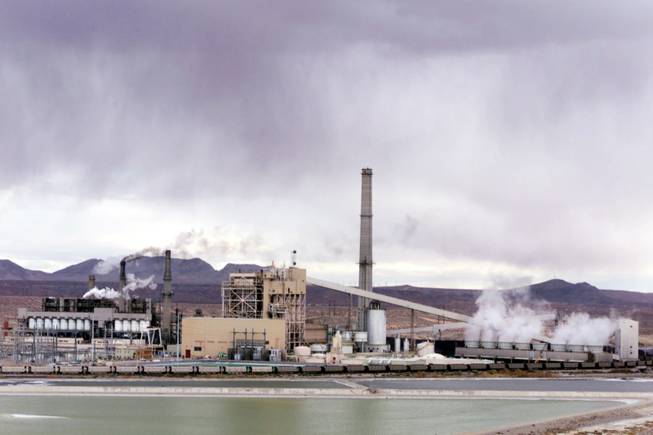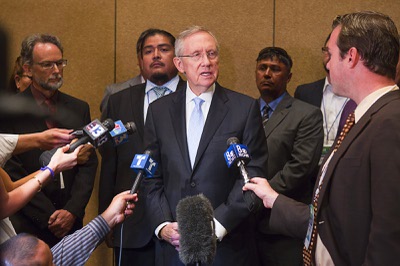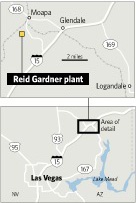Tuesday, June 4, 2013 | 2 a.m.
Legislators have officially moved Nevada out of the coal business.
In a vote Monday night, the Assembly approved a landmark energy shift away from coal-fired power plants like Reid Gardner in Clark County and mandated investment in renewable energy and natural gas.
NV Energy also scored a major victory with the passage of Senate Bill 123, which the utility company has marketed as “NVision.”
Although backed by powerful interests, the utility endured a final spat of criticism from Assembly Republicans who excoriated the plan for weakening oversight and exposing Nevadans to higher power rates.
While Nevada has long had a policy to invest in renewable energy, it has never before excluded a fossil fuel like coal from its energy portfolio. The policy shift comes with significant political weight behind it: NV Energy, U.S. Sen. Harry Reid, D-Nev., Republican Gov. Brian Sandoval, the state's major casinos, the environmental lobby, and major labor unions all support the move.
The Moapa Band of Paiutes, whose health is most affected by proximity to Reid Gardner, cheered the bill’s passage Monday.
“When we first started to call for the closure of Reid Gardner, we were told it couldn’t be done,” said Vickie Simmons, leading member of the Moapa Band of Paiutes Health and Environmental Committees. “Now, with this legislation, we are close to our goal. The coal plant that has for years poisoned our reservation will finally close and be cleaned up.”
But even the powerhouse politicians, businesses and lobbying firms behind the bill could not align everyone in support. A motley alliance including manufacturers, retailers, Republican assemblymen, former utility regulators, independent power producers, and a former Democratic attorney general railed against the proposal because they said it weakened state regulatory oversight of NV Energy.
Nonetheless, legislative observers had no doubt that the bill would pass with the support of Sandoval and the Democratic majorities in the Senate and Assembly, largely because of powerful interests aligning to move Nevada out of coal-fired power generation.
“Coal-fired power plants have long polluted our state, threatening the health of thousands of Nevadans,” said Assemblyman David Bobzien, D-Reno, a sponsor of the bill, in a statement on the Assembly floor. “Nevada has a bright future with clean energy.”
The major overhaul of the state's energy policy directs NV Energy to eliminate 800 megawatts of coal-fired power generation from its portfolio. The bill also mandates 350 megawatts of renewable energy development and utility ownership of a 550 megawatt power plant.
While some Southern Nevadans have endorsed the environmental benefits of the proposal's directive to close three-quarters of the Reid Gardner plant by 2014, the shareholder community also anticipates gains from the bill's passage.
That's because ratepayers will subsidize the company-owned power plant, and shareholders will receive a return on equity.
Despite rate increases, supporters of the bill say the risk of staying in the coal business is far greater than incremental costs of exiting the coal market.
While Sen. Kelvin Atkinson, D-Las Vegas, had proposed the bill in April, the Legislature didn't approve it until the last few hours of the last day of the legislative session.
The bill hit a major snag as the state's largest casinos first appeared on the verge of opposing the bill, which had originally called for nearly three times the amount of new power generation passed in the final version of the bill. The utility and the gaming industry — partially represented by the same lobbyists — eventually reached an agreement.
But Assembly Republicans then attempted to gum up the process, noting that the Public Utilities Commission of Nevada and the attorney general's consumer advocate had serious concerns about the bill.
“We are dealing with one of the biggest monopolies in the entire Western United States, and yet we're moving away from regulation with this bill,” said Assemblyman Ira Hansen, R-Sparks, who spent much of Monday frantically lobbying his colleagues to oppose the bill.
Meanwhile, Sandoval was making telephone calls to those same Republican members of the Assembly in hopes that they would support the bill.
Among them was Assemblyman James Oscarson, R-Pahrump, whose district includes the Reid Gardner coal plant.
“I have vacillated back and forth, and NV Energy made it well known that they'd protect the employment of my constituents,” said Oscarson, who voted for the bill.
Sandoval earlier had staked an interest in the bill. He announced support for the legislation before major amendments, an unusual move for a governor who repeatedly tells the press that he will only review legislation when it lands on his desk because it could be amended before that time.
The lengthy debates over SB123 appear to have sapped the energy of Assembly Democrats, who offered tepid support for the bill.
“I'm not totally comfortable with SB123, but it is a good step in the right direction,” said Assemblywoman Maggie Carlton, D-Las Vegas.
Still, 53 of Nevada's 63 legislators supported the bill, and the utility secured the right to construct or acquire and own a major power plant that will likely cost ratepayers hundreds of millions of dollars.
The legislation now heads to the governor's desk, and he is expected to sign the bill.





Join the Discussion:
Check this out for a full explanation of our conversion to the LiveFyre commenting system and instructions on how to sign up for an account.
Full comments policy